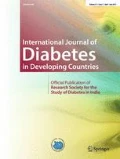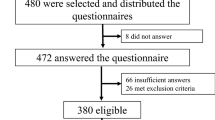Abstract
Background
Oxidative stress can reduce the quality of sleep in patients with type 2 diabetes. Antioxidants such as polyphenols may increase sleep quality by improving oxidative stress conditions.
Objective
Considering the antioxidant properties of Ellagic acid (EA), this study was designed to evaluate the effect of EA on sleep quality in diabetic patients.
Methods
In this study, 44 diabetic patients were recruited. Patients who met the inclusion criteria that were randomly allocated consumed a capsule containing 180 mg of EA per day (n = 22) or placebo (n = 22) for 8 weeks. Anthropometric factors, physical activity, food intake, and Petersburg’s Sleep Quality (PSQI) questionnaire were assessed at the beginning and end of the study. Kolmogorov-Smirnov test, paired sample t test and independent sample t test were used to analyze the data.
Results
At the end of the study, the mean scores of PSQI and sleep subgroups in the intervention group were significantly lower than in the placebo group (p < 0.05). According to intragroup comparisons, these changes were significant in the intervention group at the end of the study compared to the beginning of the study (p < 0.05) and were not significant in the placebo group (p > 0.05).
Conclusion
According to these findings, intake of EA may help to improve the sleep quality in patients with type 2 diabetes. These effects may be due to the antioxidant effects of this polyphenol.
Similar content being viewed by others

Data availability
Data from this project will not be shared because additional results from the study are yet to be published.
Abbreviations
- AGEs:
-
Advanced glycation end products
- BMI:
-
Body mass index
- DM:
-
Diabetes mellitus
- EA:
-
Ellagic acid
- FBS:
-
Fasting blood sugar
- GPx:
-
Glutathione peroxidase
- GSH:
-
Glutathione
- GSSG:
-
Oxidized glutathione
- HbA1c:
-
Hemoglobin A1c
- IL-1:
-
Interleukin-1
- IPAQ:
-
International Physical Activity Questionnaire
- MDA:
-
Malondialdehyde
- PSQI:
-
Petersburg’s Sleep Quality Index
- ROS:
-
Reactive oxygen species
- SOD:
-
Superoxide dismutase
- TNFα:
-
Tumor necrosis factor alpha
References
Öztürk E, Arslan AKK, Yerer MB, Bishayee A. Resveratrol and diabetes: a critical review of clinical studies. Biomed Pharmacother. 2017;95:230–4.
Dos Santos JM, Tewari S, Mendes RH. The role of oxidative stress in the development of diabetes mellitus and its complications. J Diabetes Res. 2019;2019.
Buzdar MJ, Ahmed F, Mengal A, Hameed T, Abbas F, Tahir HM, et al. Study on the complications by chronic diabetes mellitus type II in Quetta Balochistan. Pak-Euro J Med Life Sci. 2019;2(3):65–8.
Fasil A, Biadgo B, Abebe M. Glycemic control and diabetes complications among diabetes mellitus patients attending at University of Gondar Hospital, Northwest Ethiopia. Diabetes Metab Syndr Obes: Targets Ther. 2019;12:75.
Goldberg RB, Bray GA, Marcovina SM, Mather KJ, Orchard TJ, Perreault L, et al. Non-traditional biomarkers and incident diabetes in the diabetes prevention program: comparative effects of lifestyle and metformin interventions. Diabetologia. 2019;62(1):58–69.
Tracy EL, Berg CA, Baucom KJ, Turner SL, Kelly CS, Van Vleet M, et al. Daily sleep quality and daily stressors in couples coping with type 1 diabetes. Health Psychol. 2019;38(1):75–83.
Telford O, Diamantidis CJ, Bosworth HB, Patel UD, Davenport CA, Oakes MM, et al. The relationship between Pittsburgh sleep quality index subscales and diabetes control. Chronic Illn. 2019;15(3):210–9.
Barakat S, Abujbara M, Banimustafa R, Batieha A, Ajlouni K. Sleep quality in patients with type 2 diabetes mellitus. J Clin Med Res. 2019;11(4):261–6.
Borges YG, Cipriano LHC, Aires R, Zovico PVC, Campos FV, de Araújo MTM, et al. Oxidative stress and inflammatory profiles in obstructive sleep apnea: are short-term CPAP or aerobic exercise therapies effective? Sleep Breath. 2019:1–9.
Hahad O, Prochaska JH, Daiber A, Muenzel T. Environmental noise-induced effects on stress hormones, oxidative stress, and vascular dysfunction: key factors in the relationship between cerebrocardiovascular and psychological disorders. Oxidative Med Cell Longev. 2019;2019:1–13.
BenSaad LA, Kim KH, Quah CC, Kim WR, Shahimi M. Anti-inflammatory potential of ellagic acid, gallic acid and punicalagin A&B isolated from Punica granatum. BMC Complement Altern Med. 2017;17(1):47.
Falsaperla M, Morgia G, Tartarone A, Ardito R, Romano G. Support ellagic acid therapy in patients with hormone refractory prostate cancer (HRPC) on standard chemotherapy using vinorelbine and estramustine phosphate. Eur Urol. 2005;47(4):449–55.
Craig C, Marshall A, Sjostrom M, Bauman A, Lee P, Macfarlane D et al (2017) International Physical Activity Questionnaire-Short Form
Mollayeva T, Thurairajah P, Burton K, Mollayeva S, Shapiro CM, Colantonio A. The Pittsburgh sleep quality index as a screening tool for sleep dysfunction in clinical and non-clinical samples: a systematic review and meta-analysis. Sleep Med Rev. 2016;25:52–73.
Hosseini B, Saedisomeolia A, Wood LG, Yaseri M, Tavasoli S. Effects of pomegranate extract supplementation on inflammation in overweight and obese individuals: a randomized controlled clinical trial. Complement Ther Clin Pract. 2016;22:44–50.
Thorpy M. International classification of sleep disorders. Sleep disorders medicine. Springer;2017. p 475–84.
Tauman R, Shalitin S, Lavie L. Oxidative stress in obese children and adolescents with and without type 2 diabetes mellitus is not associated with obstructive sleep apnea. Sleep Breath. 2019;23(1):117–23.
Dalvi LT, Moreira DC, Andrade R Jr, Ginani J, Alonso A, Hermes-Lima M. Ellagic acid inhibits iron-mediated free radical formation. Spectrochim Acta A Mol Biomol Spectrosc. 2017;173:910–7.
Alzoubi KH, Khabour OF, Rashid BA, Damaj IM, Salah HA. The neuroprotective effect of vitamin E on chronic sleep deprivation-induced memory impairment: the role of oxidative stress. Behav Brain Res. 2012;226(1):205–10.
Majid MS, Ahmad HS, Bizhan H, Hosein HZM, Mohammad A. The effect of vitamin D supplement on the score and quality of sleep in 20–50 year-old people with sleep disorders compared with control group. Nutr Neurosci. 2018;21(7):511–9.
Wightman EL, Haskell-Ramsay CF, Reay JL, Williamson G, Dew T, Zhang W, et al. The effects of chronic trans-resveratrol supplementation on aspects of cognitive function, mood, sleep, health and cerebral blood flow in healthy, young humans. Br J Nutr. 2015;114(9):1427–37.
Kanagasabai T, Ardern CI. Inflammation, oxidative stress, and antioxidants contribute to selected sleep quality and cardiometabolic health relationships: a cross-sectional study. Mediat Inflamm. 2015;2015:1–11.
Morris G, Stubbs B, Köhler CA, Walder K, Slyepchenko A, Berk M, et al. The putative role of oxidative stress and inflammation in the pathophysiology of sleep dysfunction across neuropsychiatric disorders: focus on chronic fatigue syndrome, bipolar disorder and multiple sclerosis. Sleep Med Rev. 2018;41:255–65.
Hedayati A, Gholampour Y, Dehghan A. The relation between sleep disorders and hemoglobin A1c levels in patients with type II diabetes mellitus. Med J Mashhad Univ Med Sci. 2016;59(3):179–87.
Talaei B, Amouzegar A, Sahranavard S, Hedayati M, Mirmiran P, Azizi F. Effects of cinnamon consumption on glycemic indicators, advanced glycation end products, and antioxidant status in type 2 diabetic patients. Nutrients. 2017;9(9):991.
Ryan S. Adipose tissue inflammation by intermittent hypoxia: mechanistic link between obstructive sleep apnoea and metabolic dysfunction. J Physiol. 2017;595(8):2423–30.
Acknowledgments
The authors would like to thank all of the participants who completed the study protocol. This work was financially supported by a Grant (Number: IR.QUMS.REC.1398.079) from Vice-Chancellor for Research Affairs of Qazvin University of Medical Sciences, Qazvin, Iran.
Authors’ details
MG: MSc, Department of Nutrition, School of Health, Qazvin University of Medical Sciences.
SH: Department of Internal Medicine, Velayat Clinical Research Development Unit, Qazvin University of Medical Sciences.
MRN: Department of Pharmacology and Toxicology, School of Pharmacy, Ahvaz Jundishapur University of Medical Sciences.
MK: Department of Tissue Engineering and Applied Cell Sciences, Faculty of Advanced Technologies in Medicine, Tehran University of Medical Sciences.
HKH: Metabolic Diseases Research Center, Research Institute for Prevention of Non-Communicable Diseases, Qazvin University of Medical Sciences.
Funding
This work was financially supported by a Grant (Number: IR.QUMS.REC.1398.079) from Vice-Chancellor for Research Affairs of Qazvin University of Medical Sciences, Qazvin, Iran. This investigation was extracted from the Master of Science thesis of Zahra Mirzaie, student of Qazvin University of Medical Sciences.
Author information
Authors and Affiliations
Contributions
All persons who met authorship criteria are listed as authors. M Ghadimi, M Kavianpour, and H Khadem Haghighian contributed significantly to the work’s conception, participated in the writing and critical revision of the manuscript in a manner sufficient to establish the ownership of the intellectual content. S Hashemipour and M Rashidi Nooshabadi contributed significantly to the work’s conception. H Khadem Haghighian analyzed and interpreted data. M Ghadimi and M Kavianpour involved in the design of work. All authors approved the final version of the manuscript to be published.
Corresponding authors
Ethics declarations
Ethics
The study was approved by the Ethical Committee of Qazvin University of Medical Sciences with grant number of IR.QUMS.REC.1398.079 and also registered by the identification code IRCT20141025019669N13 in clinical trial registry of Iran. Informed consent was obtained from these individuals to participate in the study.
Conflict of interest
The authors declare that they have no conflict of interest.
Ethics approval and consent to participate
The protocol of the study after approving with the ethic committee of Qazvin University of Medical Sciences, Qazvin, Iran, with grant number of Number: IR.QUMS.REC.1398.079, was registered in the Iranian Registry of Clinical Trials website by the IRCT20141025019669N13 code. Also, written informed consent was given by all the participants before their inclusion in the study.
Additional information
Publisher’s note
Springer Nature remains neutral with regard to jurisdictional claims in published maps and institutional affiliations.
Rights and permissions
About this article
Cite this article
Ghadimi, M., Hashemipour, S., Nooshabadi, M.R. et al. The effect of Ellagic acid on sleep quality in patients with type 2 diabetes: a randomized double blind clinical trial. Int J Diabetes Dev Ctries 41, 29–36 (2021). https://doi.org/10.1007/s13410-020-00849-w
Received:
Accepted:
Published:
Issue Date:
DOI: https://doi.org/10.1007/s13410-020-00849-w


